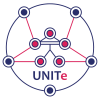Science for the benefit of society: Who are UNITe?
With the financial support of


Vision
The vision of the UNITe Center of Excellence is to establish its position as a leading national organization in the field of scientific research in “Computer Science and Information and Communication Technologies (ICT)”. The Center is developing a modern, distributed research infrastructure covering all regions of Bulgaria, which attracts distinguished scientists and young talents. UNITe aims to be fully integrated into the European Research Area and recognized for the high quality of its results and its contribution to the national and regional economy and society.
Goals
The main goals of UNITe include promoting integration and increasing the capacity of partners to conduct cutting-edge research in the field of “Informatics and ICT.” The center aims to attract and develop talented researchers, build the next generation of scientists, and expand cooperation with external stakeholders. Priorities include technology transfer, the deployment of research and innovation networks with leading European partners and teams in the fields of high-performance computing (HPC), big data, artificial intelligence, and other contemporary areas, with the aim of accelerating digital transformation and the development of the economy and society.
Laboratories and Equipment
The UNITe Center of Excellence has 18 specialized laboratories located in four cities:
- Sofia – 6 laboratories
- Burgas – 5 laboratories
- Ruse – 5 laboratories
- Shumen – 2 laboratories
Work Packages
Work package 1: Innovative mathematical methods and models in support of the digital transformation
The activities envisaged in this package are aimed at developing innovative mathematical methods and models that guarantee quality, security, and effective use of data as a key driver of the digital transformation in the economy and the public sector.
Work Package 2: Data-oriented AI applications
The main objective of the planned activities here is to explore and address challenges in the field of Deep Learning (DL), such as understanding the limitations of Large Language Models (LLMs), the reasons for generating inappropriate or harmful content, the mechanisms behind their predictions, and the need for significant resources for training, updating, and use.
Work Package 3: Innovative methods, technologies, and tools for modern technology-enhanced learning
The main objective of this package is to investigate how adaptive and personalized learning systems can be tailored to the pace, style, and progress of learners, providing individualized learning, as well as how technologies such as VR and AR can be effectively integrated into TEL to create an interactive and engaging learning environment.
Work package 4: Bioinformatics – processing of large data sets, sequencing, parallel processing, prototyping
The goal is to develop a new generation of databases for intelligent process management and control, applying modern methods for formalization, extraction, and analysis of information in large data sets, as well as the creation of innovative solutions for the implementation of a heterogeneous environment – both at the application programming interface (API) level and at the machine instruction processing (ABI) level.
Work package 5: 3D technologies for an innovative and sustainable future, led by “Angel Kanchev” University of Ruse
This work package explores 3D technologies for digitization and visualization, as well as their various areas of application. Despite the progress made, there are a number of challenges – most modern solutions still only allow the creation of 3D models of static objects, which limits the possibility of complete digitization of dynamic processes and movements.
Work Package 6: Smart and Sustainable Systems
This work package aims to develop scientific research and innovation in the field of cyber-physical systems, digital doubles and sustainable technologies, with a primary focus on their application in industry, energy management, and smart cities.
Work Package 7: Cybersecurity and new methods for prevention and protection against cyberattacks
This work package focuses on developing modern solutions for protecting digital systems, networks and infrastructure from growing cyber threats, with a primary emphasis on intelligent methods that use artificial intelligence, machine learning, and the Internet of Things (IoT) to detect, prevent, and respond to attacks.
